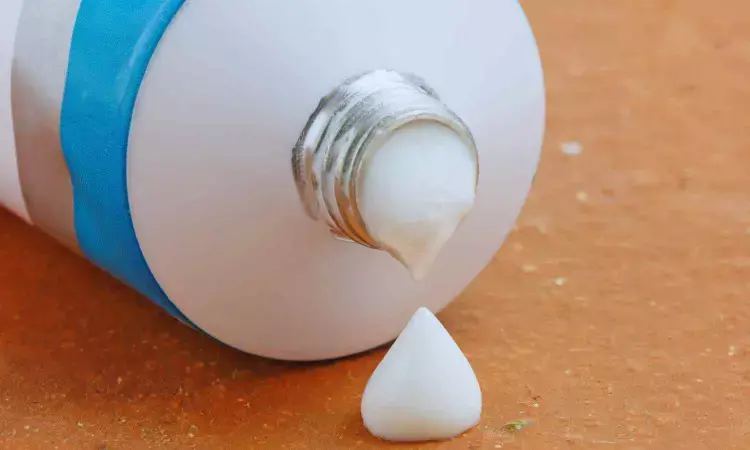- Home
- Medical news & Guidelines
- Anesthesiology
- Cardiology and CTVS
- Critical Care
- Dentistry
- Dermatology
- Diabetes and Endocrinology
- ENT
- Gastroenterology
- Medicine
- Nephrology
- Neurology
- Obstretics-Gynaecology
- Oncology
- Ophthalmology
- Orthopaedics
- Pediatrics-Neonatology
- Psychiatry
- Pulmonology
- Radiology
- Surgery
- Urology
- Laboratory Medicine
- Diet
- Nursing
- Paramedical
- Physiotherapy
- Health news
- Fact Check
- Bone Health Fact Check
- Brain Health Fact Check
- Cancer Related Fact Check
- Child Care Fact Check
- Dental and oral health fact check
- Diabetes and metabolic health fact check
- Diet and Nutrition Fact Check
- Eye and ENT Care Fact Check
- Fitness fact check
- Gut health fact check
- Heart health fact check
- Kidney health fact check
- Medical education fact check
- Men's health fact check
- Respiratory fact check
- Skin and hair care fact check
- Vaccine and Immunization fact check
- Women's health fact check
- AYUSH
- State News
- Andaman and Nicobar Islands
- Andhra Pradesh
- Arunachal Pradesh
- Assam
- Bihar
- Chandigarh
- Chattisgarh
- Dadra and Nagar Haveli
- Daman and Diu
- Delhi
- Goa
- Gujarat
- Haryana
- Himachal Pradesh
- Jammu & Kashmir
- Jharkhand
- Karnataka
- Kerala
- Ladakh
- Lakshadweep
- Madhya Pradesh
- Maharashtra
- Manipur
- Meghalaya
- Mizoram
- Nagaland
- Odisha
- Puducherry
- Punjab
- Rajasthan
- Sikkim
- Tamil Nadu
- Telangana
- Tripura
- Uttar Pradesh
- Uttrakhand
- West Bengal
- Medical Education
- Industry
Topical Omega-3 PUFAs Show Promise for Skin Conditions Like Psoriasis and Dermatitis: Study

A new study published in the Journal of Cosmetic Dermatology revealed that dermatologic benefits of topical omega-3 polyunsaturated fatty acids (omega-3 PUFAs), showing improvements in skin hydration, reduced inflammation, and enhanced wound healing in conditions such as psoriasis, dermatitis, and melanoma.
Recent research is highlighting the potential skin-healing powers of omega-3 polyunsaturated fatty acids which was long known for their health benefits when consumed through diet or supplements. This review by Laura Mateu-Arrom and team assessed the topical use and suggested that these fatty acids may offer a safe and effective complementary therapy for a variety of dermatological conditions.
The review was conducted in accordance with PRISMA (Preferred Reporting Items for Systematic Reviews and Meta-Analysis) guidelines, went through current literature to assess the efficacy and safety of applying ω-3 PUFAs directly to the skin. This study excluded studies that focused solely on oral supplementation, lacked sufficient information about ω-3 PUFA composition, or used fish skin grafts to ensure a tight focus on topically applied formulations.
These studies analyzed the anti-inflammatory properties of ω-3 PUFAs which consistently contributed to visible skin improvements in various disease models. In cases of psoriasis, the topical application reduced redness, scaling, and lesion thickness. In wound healing models, ω-3 PUFAs accelerated tissue repair and regeneration. In case of dermatitis, they helped reduce itching and inflammation, and in melanoma research, these compounds showed potential for supporting immune responses without harming healthy tissue.
None of these studies reported adverse events such as skin irritation, allergic reactions, or cytotoxicity which is a strong indicator of the treatment’s safety profile. This research emphasized that the beneficial outcomes were most often linked to the ability of fatty acids to regulate inflammation, restore skin barrier function, and modulate immune activity at the site of application.
The detailed analysis across the included studies showed some variations in formulations, including different types of ω-3 PUFAs like eicosapentaenoic acid (EPA), docosahexaenoic acid (DHA), or alpha-linolenic acid (ALA), as well as differences in concentration and vehicles used (e.g., gels, creams, or emulsions).
Overall, topical omega-3s are safe and may be effective in managing skin conditions, but standardized treatment approaches are still under development. While the current evidence is promising, the topical use of ω-3 PUFAs remains an emerging field and this call for more focused clinical studies to standardize protocols and better understand the mechanisms at play.
Reference:
Mateu-Arrom, L., Mora, I., & Garrote, L. (2025). Therapeutic benefits of topical omega-3 polyunsaturated fatty acids in skin diseases and cosmetics: An updated systematic review. Journal of Cosmetic Dermatology, 24(7), e70341. https://doi.org/10.1111/jocd.70341
Neuroscience Masters graduate
Jacinthlyn Sylvia, a Neuroscience Master's graduate from Chennai has worked extensively in deciphering the neurobiology of cognition and motor control in aging. She also has spread-out exposure to Neurosurgery from her Bachelor’s. She is currently involved in active Neuro-Oncology research. She is an upcoming neuroscientist with a fiery passion for writing. Her news cover at Medical Dialogues feature recent discoveries and updates from the healthcare and biomedical research fields. She can be reached at editorial@medicaldialogues.in
Dr Kamal Kant Kohli-MBBS, DTCD- a chest specialist with more than 30 years of practice and a flair for writing clinical articles, Dr Kamal Kant Kohli joined Medical Dialogues as a Chief Editor of Medical News. Besides writing articles, as an editor, he proofreads and verifies all the medical content published on Medical Dialogues including those coming from journals, studies,medical conferences,guidelines etc. Email: drkohli@medicaldialogues.in. Contact no. 011-43720751


